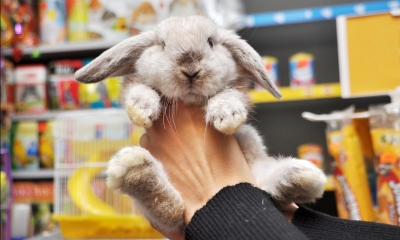
There are several pieces of legislation that apply to pet shops. They cover areas such as licensing, retailing, and selling insurance.
What licences does a pet shop need?
If you intend to sell any animals you will need a licence from your local authority. Your local authority will want to inspect your premises for suitability before granting you a licence. Most local authorities will also want you to have (or be working towards) a relevant qualification in animal care at an appropriate level.
The cost of a licence varies from one area to another (the usual range is currently around £100 to £350). An additional fee may be due if an inspection by a vet is required. The licence lasts until the end of the year in which it is granted and then must be renewed each year, running from January to December. Contact your local environmental health department to find out how much it will cost in your area. You can read more about pet shop licensing and apply for a licence on the Gov.uk website.
You will also have to meet the cost of making sure that your premises are suitable. These are set out in the guidance for commercial pet vending that you can download from the Pet Industry Federation website.
Following a consultation on animal establishments licensing in England, the Department for Environment, Food and Rural Affairs made various changes to the licensing regulations. The changes apply from October 2018 to all animal establishments, including pet shops, in England and:
- introduce a single 'animal activities' licence, which covers four animal activities, including selling pets
- introduce 'model conditions' that must be used by all Local Authorities
- prohibit the sale of puppies and kittens
- reduce the statutory licensing threshold for dog breeders from five to three or more litters a year
- require pet sellers when selling animals to provide written information covering the five freedoms in the Animal Welfare Act
- remove the calendar-year restriction when issuing licences for a fixed term
- increase the maximum licence length up to three years
- retain the prohibition on licence holders transferring licences to new owners of the same premises
- require licence holders to notify local authorities of major changes, such as a change of premises or the scale of activities
Other things to consider
You may need a special wildlife licence if you want to sell certain types of animal, for example rare or protected species. Contact your local trading standards department for more information. Note that anyone who breeds and sells dogs as a business needs a dog breeding licence from their local authority.
If you want to supply certain restricted animal medicines - known as 'POM-VPS' and 'NFA-VPS'- then you'll need to train as a 'Suitably Qualified Person' and register with the Animal Medicines Training Regulatory Authority (AMTRA). Your premises will also need to be approved by and registered with the Veterinary Medicines Directorate (VMD). Note that this requirement also applies to online retailers.
If you plan to play background music in the shop you will probably need a Music Licence from PPL PRS Ltd. There is an annual fee for this which you can pay online on the PPL PRS website.
Selling general insurance
Anyone who sells, advises on, arranges or assists in selling general insurance - for example pet insurance - may need to be regulated by the Financial Conduct Authority (FCA) even if insurance is only a small part of their business. You will need to be either directly authorised by the FCA or an 'appointed representative' of an authorised principal. Contact the FCA for further information.
Retailing
There is a wide range of legislation that applies to retail outlets, much of which protects the interests of the consumer. For example, the retail price of goods must be clearly displayed. You will be responsible for making sure that all goods or services are fit for their intended purpose and of satisfactory quality.
Detailed information on consumer protection legislation is available on the Trading Standards Business Companion website. The Gov.uk website also has information and guidance for businesses. Your local trading standards department should be able to answer specific queries about how consumer protection legislation affects your business.
Other legislation
There are several pieces of legislation which are particularly relevant to pet shops. These include:
- the Pet Animals Act, which requires your shop to be licensed if you sell pets
- the Welfare of Animals (Transport) Order - you must comply with specific requirements if you transport animals more than 65 kilometres or for over eight hours for commercial purposes (the regulations also make some provisions for shorter journeys)
- the Animal Welfare Act. The minimum age limit for anyone buying an animal from a pet shop in England and Wales is 16 years. Under the Act there are special welfare codes of practice for owners and keepers of dogs, cats, horses and certain other animals. Separate animal welfare legislation applies in Scotland and Northern Ireland
- the Control of Substances Hazardous to Health (COSHH) Regulations, which apply to strong cleaning materials and also cover infectious diseases which can be passed on to humans from animals
- the Environmental Protection Act and regulations made under it, which apply to the noises, smells and disposal of waste
Your local environmental health department will be able to advise you on how the above legislation, including pet shop licensing conditions, affects your business. The conditions of your pet shop licence will probably include a requirement for you to have an evacuation procedure in place in the event of fire, with all staff being trained in this.
If you intend to become involved with importing live animals on your own account then you will have to comply with a range of different legislation. You can find out more about all aspects of animal welfare legislation throughout the UK from:
- the Department of Agriculture, Environment and Rural Affairs in Northern Ireland
- the Department for Environment, Food and Rural Affairs (DEFRA) in England and Wales - see the DEFRA section of the Gov.uk website for information
- the Scottish Government
Pet shops which sell loose and bagged down feeds are affected by the Weights and Measures Act and possibly also by laws covering the labelling of animal feeds. Your local trading standards department should be able to advise you.
Carrier bag charge
A minimum 10p charge applies for single-use carrier bags in England (other rules apply in Wales, Scotland and Northern Ireland). You can get detailed guidance from the GOV.UK website.
Health & Safety, fire
You must comply with workplace health and safety and fire safety legislation.
The Health and Safety at Work Act and the numerous regulations made under it cover all aspects of health and safety. Employers have a duty to ensure the health and safety at work of all their employees. Those with five or more employees must prepare a written health and safety policy statement. Some key areas where health and safety regulations affect your business, particularly if you employ staff, include:
- use of potentially hazardous substances
- access to first aid equipment
- adequate provision and use of protective clothing and equipment
- reporting of any accidents at work
Further information and guidance leaflets on all aspects of health and safety are available on the Health and Safety Executive (HSE) and Health and Safety Executive Northern Ireland (HSENI) websites - and from your local authority environmental health department.
Employment legislation
Anyone employing staff must comply with employment legislation. Important areas of legislation include recruitment, employment contracts, pay, working hours, holidays, employment policies, sickness, maternity, paternity, discrimination, discipline, grievances, dismissals, redundancies and employment tribunals.
Insurance for a pet shop
Contact an insurer or insurance broker and explain exactly how your business will operate - they will then explain what insurance cover you must have by law, and other cover you should consider. This might include:
- premises, premises contents, stock and animals
- employer's liability (a legal requirement if you employ staff)
- public liability
- motor insurance (for any business vehicles)
- cover for malicious release of animals
- breakdown of heating and filtration equipment
The Pet Retailers Association, part of the Pet Industry Federation (PIF), offers its members access to pet industry specific business insurance. You can find out more on the PIF website.
The Pet Product Retail Association, part of the British Independent Retailers Association (BIRA), also offers bespoke business insurance services to its members.


